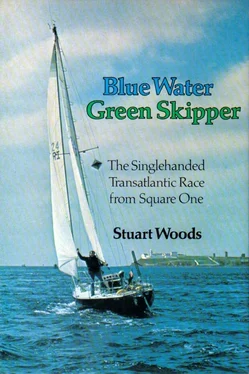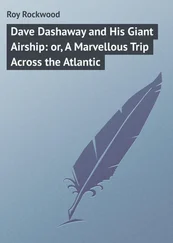The whole of the time I was at the top of the mast I thought about two things to the exclusion of everything else. The first was Brian Cooke falling onto the decks of Triple Arrow and breaking his back; the second was a teenager jumping from the yardarm of a tall training ship that summer, striking the water and dying instantly from the impact. That was all I could think about.
When I had finally inched my way back down the mast I sat on the deck for fifteen minutes until I could make a fist again, then repaired the Dynafurl and hoisted a foresail. I was nearly as tired as I had been after rescuing the sails. And while I had been doing that, other things had been going wrong. I discovered that when falling off a wave, Harp had jammed the log impeller up into the hull, freezing the mileage recorder. This was easily put right, but I had no idea when it had happened, and not knowing what distance I had covered screwed up my dead reckoning mightily. I hadn’t had a firm position fix for several days, because there had been so little sun, and with my dead reckoning out, I was very unsure of my position and still not close enough to land to use radio direction finding.
Then the engine refused to switch off. I had been charging batteries, and the lever which controlled the accelerator had jammed, corroded by seawater that had reached the engine through the cockpit floor, which was almost impossible to seal properly because of the way it was constructed. No amount of easing oil or blows with spanners and winch handles would free the lever, so now the only way to stop the engine was to turn off the fuel cocks and let it run out of fuel. Then, before starting again, the fuel system had to be bled to get out the air bubbles in the fuel lines.
Next, my last disposable lighter refused to work, and, having no matches on board, I had no way to light the cooker. This meant no hot food, no hot coffee, no hot anything, and I was not looking forward to eating cold tinned food.
Finally, the main alternator failed, but at least I was able to plug in the spare. It would charge only one battery at a time, though, so I had to switch leads to charge both batteries, and I could not run the engine and use the other electrics at the same time. Bloody nuisance it turned out to be, too.
By Tuesday I was over the continental shelf and had a rough RDF position, but I was anxious to contact a ship for a tighter fix. Once, when I had been lying on the foredeck repairing the wiring to the forward navigation light, I saw first one, then four ships, but the engine was running at the time to charge batteries and I couldn’t use the VHF. In the early hours of Tuesday morning I spotted a brightly lit fishing boat nearby and began signaling KVHF. He apparently didn’t read Morse, so he came over for a closer look. He was soon well within shouting distance, but my electric loud-hailer chose this moment to malfunction, so I was reduced to shouting “VHF — Radio” as he circled and came up about fifteen yards off my starboard quarter, running alongside and slightly behind us. It was a huge steel trawler, a hundred feet or so in length, and she was wearing a German or Dutch name that I could never quite read. I shouted repeatedly, but there was lots of shrugging and shaking of heads by everybody on deck.
Suddenly, the helmsman put his helm over all the way to port — I could see him in the wheelhouse spinning the wheel — and started across my stern without reducing speed in the least. I froze in the cockpit as the enormous trawler came toward us — I was actually looking up at her bows — and waited for the crash. The thought raced through my mind that if I went below to get a life jacket I would be trapped there when the collision occurred, and that there was no time to launch the life raft. So I stood, clutching a winch and bracing myself for the blow. He missed Harp ’s stern by less than ten feet, and took more than ten years off my life. I turned the signaling torch on myself and waved him away. I resolved never again to ask a fisherman for help or advice unless I was really in a bad way.
I got little sleep that night, keeping a watch for shipping, then at dawn I saw a strange shape sticking up over the horizon. My binoculars had fogged up from being wet, so I couldn’t identify it, but I thought it must be an uncharted oil rig, and since it seemed to be receding I went below to make a cup of coffee. I had begun hearing jets passing overhead now and figured I must be on the London — Cork air route. A few minutes later I heard a helicopter, a very loud helicopter, and went on deck to find a U.S. Navy chopper hovering about a hundred feet directly above the boat. I looked astern and there was the largest warship in the world, the USS Nimitz, a nuclear-powered aircraft carrier more than a thousand feet long and with a crew of five thousand. I knew about her from an interview I had heard on the BBC with one of her officers. She had been on a courtesy visit to England and she was now apparently trying to find out what the hell a small yacht was doing sailing about with no one at the helm. I waved at the chopper crew and they went away, apparently satisfied that there was someone on board. Again, the engine was running and I couldn’t call her up on VHF.
Tuesday passed quietly with light weather and occasional rain, but toward evening the wind freshened and I was running at a good clip, on course for Crosshaven, I hoped. I was still a bit shaky on my position, getting good bearings from Old Head of Kinsale and Galley Head, but unreliable ones from Round Island, in the Scillies. I began to plan a landfall about eight-thirty the following morning at Roberts Head, just outside Cork Harbor.
I stayed up all night, waiting for Old Head light to appear, hoping it would be in the right place. To make matters worse, my log had begun to overread, destroying my dead reckoning. It began to drizzle heavily and I worried about visibility as I approached the Irish coast. About four a.m. I sighted the loom of Old Head light. I got a quick bearing on it and settled down for the light itself to appear. Roche’s Point light at the entrance to Cork Harbor would appear, eventually, too.
Then the visibility closed in completely. The drizzle obliterated everything, and although I kept a vigil I was never able to raise either light. Dawn came in the most peculiar way. It was not possible even to tell where the sun was rising. Everything just changed from black to ever lightening shades of gray until it was full daylight. All I could see was fog. There was not even a bird about to give me some idea of how far I could see. The terrible thing about fog is that it makes it impossible to judge distance.
I sat in the watch seat with the depth sounder in my hands, watching the water get shallower and shallower. I expected an eight-thirty landfall and the soundings seemed to confirm this. I felt pretty sure that I would sight land somewhere between Kinsale and Cork, a distance of about fourteen miles, but then I could also make my landfall east of Cork. I could only point the boat at where I thought Roberts Head might be and hope for the best.
The sounder read forty fathoms, then twenty, then fifteen, then twelve. Eight-thirty came and went. Still no land. Still no visibility. Then I heard a noise like the engines of a ship. Oh, God, I thought, as if making a landfall in no visibility weren’t enough, I’ve got to dodge a ship or fishing boat. I doubled my efforts to see through the fog. All I could see was a white line on the water just ahead of us. A streak of detergent foam washed out of some river, I thought. Then, less than two hundred yards dead ahead, a large, green cliff appeared out of the fog. The noise had been the sea pounding against it. The white line had been the surf. I had found Ireland; now I had to find Crosshaven.
Читать дальше












